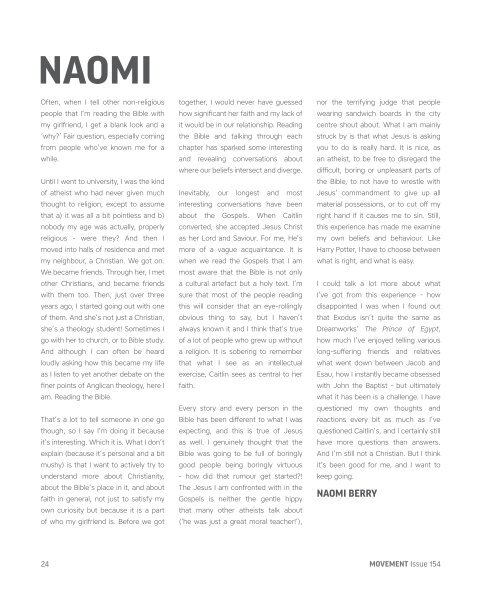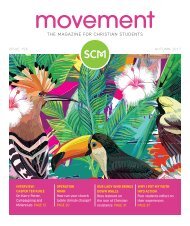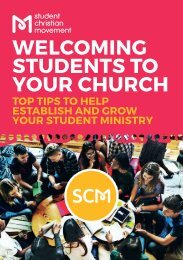Movement magazine issue 154
The Student Christian Movement's magazine.
The Student Christian Movement's magazine.
You also want an ePaper? Increase the reach of your titles
YUMPU automatically turns print PDFs into web optimized ePapers that Google loves.
NAOMI<br />
CAITLIN<br />
Often, when I tell other non-religious<br />
people that I’m reading the Bible with<br />
my girlfriend, I get a blank look and a<br />
‘why?’ Fair question, especially coming<br />
from people who’ve known me for a<br />
while.<br />
Until I went to university, I was the kind<br />
of atheist who had never given much<br />
thought to religion, except to assume<br />
that a) it was all a bit pointless and b)<br />
nobody my age was actually, properly<br />
religious - were they? And then I<br />
moved into halls of residence and met<br />
my neighbour, a Christian. We got on.<br />
We became friends. Through her, I met<br />
other Christians, and became friends<br />
with them too. Then, just over three<br />
years ago, I started going out with one<br />
of them. And she’s not just a Christian,<br />
she’s a theology student! Sometimes I<br />
go with her to church, or to Bible study.<br />
And although I can often be heard<br />
loudly asking how this became my life<br />
as I listen to yet another debate on the<br />
finer points of Anglican theology, here I<br />
am. Reading the Bible.<br />
That’s a lot to tell someone in one go<br />
though, so I say I’m doing it because<br />
it’s interesting. Which it is. What I don’t<br />
explain (because it’s personal and a bit<br />
mushy) is that I want to actively try to<br />
understand more about Christianity,<br />
about the Bible’s place in it, and about<br />
faith in general, not just to satisfy my<br />
own curiosity but because it is a part<br />
of who my girlfriend is. Before we got<br />
together, I would never have guessed<br />
how significant her faith and my lack of<br />
it would be in our relationship. Reading<br />
the Bible and talking through each<br />
chapter has sparked some interesting<br />
and revealing conversations about<br />
where our beliefs intersect and diverge.<br />
Inevitably, our longest and most<br />
interesting conversations have been<br />
about the Gospels. When Caitlin<br />
converted, she accepted Jesus Christ<br />
as her Lord and Saviour. For me, He’s<br />
more of a vague acquaintance. It is<br />
when we read the Gospels that I am<br />
most aware that the Bible is not only<br />
a cultural artefact but a holy text. I’m<br />
sure that most of the people reading<br />
this will consider that an eye-rollingly<br />
obvious thing to say, but I haven’t<br />
always known it and I think that’s true<br />
of a lot of people who grew up without<br />
a religion. It is sobering to remember<br />
that what I see as an intellectual<br />
exercise, Caitlin sees as central to her<br />
faith.<br />
Every story and every person in the<br />
Bible has been different to what I was<br />
expecting, and this is true of Jesus<br />
as well. I genuinely thought that the<br />
Bible was going to be full of boringly<br />
good people being boringly virtuous<br />
- how did that rumour get started?!<br />
The Jesus I am confronted with in the<br />
Gospels is neither the gentle hippy<br />
that many other atheists talk about<br />
(‘he was just a great moral teacher!’),<br />
nor the terrifying judge that people<br />
wearing sandwich boards in the city<br />
centre shout about. What I am mainly<br />
struck by is that what Jesus is asking<br />
you to do is really hard. It is nice, as<br />
an atheist, to be free to disregard the<br />
difficult, boring or unpleasant parts of<br />
the Bible, to not have to wrestle with<br />
Jesus’ commandment to give up all<br />
material possessions, or to cut off my<br />
right hand if it causes me to sin. Still,<br />
this experience has made me examine<br />
my own beliefs and behaviour. Like<br />
Harry Potter, I have to choose between<br />
what is right, and what is easy.<br />
I could talk a lot more about what<br />
I’ve got from this experience - how<br />
disappointed I was when I found out<br />
that Exodus isn’t quite the same as<br />
Dreamworks’ The Prince of Egypt,<br />
how much I’ve enjoyed telling various<br />
long-suffering friends and relatives<br />
what went down between Jacob and<br />
Esau, how I instantly became obsessed<br />
with John the Baptist - but ultimately<br />
what it has been is a challenge. I have<br />
questioned my own thoughts and<br />
reactions every bit as much as I’ve<br />
questioned Caitlin’s, and I certainly still<br />
have more questions than answers.<br />
And I’m still not a Christian. But I think<br />
it’s been good for me, and I want to<br />
keep going.<br />
NAOMI BERRY<br />
With glee, I suggested to Naomi that<br />
we take part in my Church’s ‘Bible in<br />
a year’ challenge. I didn’t think that<br />
this would stop the barrage of daily<br />
questions about Christianity, but I did<br />
think that it would give her context<br />
for my own explanations of theology,<br />
orthodoxy, and the quirks of the<br />
Church.<br />
Naomi is intelligent, and I knew she<br />
would love the strangeness of biblical<br />
texts, especially the Hebrew Bible. The<br />
trickster Jacob and the fool Esau, the<br />
drama of Exodus, and the polemic of<br />
David’s psalms delighted her, and it<br />
has been even more delightful for me<br />
to read these with her. Bible study has<br />
been fun with texts from the Hebrew<br />
Bible. Reading Ruth together was<br />
wonderful because we were able to<br />
discuss the various interpretations<br />
of the relationship between Ruth and<br />
Naomi, arguing over which made the<br />
most sense and conceding that more<br />
than one reading can be applied.<br />
Reading the New Testament has been<br />
less fun for me. Because it is more<br />
central to my faith, the challenges that<br />
came from Naomi felt more personal<br />
to me. I didn’t mind laughing over the<br />
stupidity of Abraham trying to pass<br />
his wife off as his sister, but I did mind<br />
criticism of Jesus. I was constantly<br />
gauging her reaction to Him and giving<br />
my own explanation of the text, figuring<br />
out where I stood in relation to it and<br />
trying to convince her to agree with me.<br />
It reminded me very much of reading<br />
these texts myself for the first time; I<br />
converted from atheism at 19, went<br />
to university to read English and came<br />
out with a Theology degree specialising<br />
in biblical studies. Because of my<br />
experience of studying the Bible with<br />
other Christians and other students, I<br />
thought I would be able to approach<br />
this objectively. I was prepared - I had<br />
my theology textbooks, my knowledge<br />
of biblical exegesis, and some of the<br />
apologist arguments I was fond of<br />
when I first converted.<br />
But objectivity has not happened.<br />
Something about reading the Gospels<br />
with someone who I love and respect,<br />
and in our home, meant that I was<br />
much closer to reading it devotionally,<br />
but I was still being confronted with<br />
criticisms I would expect to be fielded<br />
in a university or evangelistic setting. I<br />
had read the Gospels critically before, I<br />
had read them with Christians before,<br />
but never before had I read it in a<br />
personal way with someone who wasn’t<br />
a scholar and wasn’t a Christian, but<br />
who early on grasped the elementals<br />
of exegesis. I’ve suddenly become<br />
equally yoked with someone in terms of<br />
biblical interpretation, except that their<br />
views often differ greatly from my own.<br />
This hit me harder than I expected,<br />
especially when Naomi didn’t like<br />
something that Jesus said or disliked<br />
one of my favourite verses. However,<br />
giving concise reasons for why I<br />
found something beautiful or morally<br />
challenging helped me to understand<br />
my own relationship to the Gospels.<br />
I feel like layers of interpretation and<br />
certainty have been pulled away and I<br />
am left looking at the Bible in its raw<br />
and powerful complexity. And this<br />
will happen again and again as I keep<br />
rereading it. And I will encourage<br />
others to read the Bible for themselves,<br />
and not as a means of conversion. The<br />
Bible is more than John 3:16, and more<br />
than an ancient text. It is a holy text,<br />
but it is also a cultural artefact. There<br />
is so much interpretation, so much<br />
which needs to be contextualised,<br />
dissected, explained and contested.<br />
We have as much right to embrace this<br />
odd collection of books as previous<br />
generations have - creating meaning,<br />
and insight, and most importantly<br />
destabilising the truths, reactions and<br />
certainties we had previously taken<br />
from them. We should remember<br />
this, the weirdness of these texts,<br />
their plurality and mystery and the<br />
fascination that they hold not just for<br />
Christians, but for everyone. Reading<br />
the Bible is an end in itself, not merely<br />
a means to substitutionary salvation.<br />
CAITLIN WAKEFIELD<br />
24 MOVEMENT Issue <strong>154</strong> MOVEMENT Issue <strong>154</strong><br />
25




